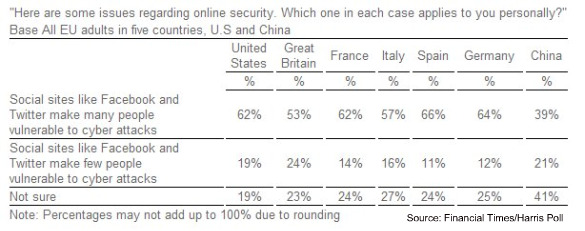A majority of adults under 65 in the US, several major European countries, and China are concerned about online security, according to a new Financial Times/Harris Poll.
Search Engines, ISPs Raise Concerns
Three in five Americans (61%), majorities of French adults (56%), Spaniards (55%), Chinese (54%) and Britons (52%) as well as 46% of Germans and 40% of Italians are concerned about the amount and security of personal online data that can be accessed by search engines people use, such as Google or Bing. There is slightly more concern over the amount and security of personal online data that can be accessed by people’s Internet Service Provider (between 45% in Italy and 64% in the US).
Hackers Pose Threat
The greatest amount of concern among global respondents regards being hacked. Four in five Americans (81%), Chinese (81%) and Spaniards (79%), three-quarters of French adults (75%) and Britons (73%), and two-thirds of Italians (67%) and Germans (65%) all say they are concerned about the amount and security of personal online data that can be accessed by cybercriminals and hackers. More than half of Spaniards (56%), Americans (55%) and Chinese (53%) say they are very concerned. When it comes to hackers and cybercriminals using online personal data/details, majorities in all seven countries (between 56% and 80%) are worried.
Hackers Pose Threat
The greatest amount of concern among global respondents regards being hacked. Four in five Americans (81%), Chinese (81%) and Spaniards (79%), three-quarters of French adults (75%) and Britons (73%), and two-thirds of Italians (67%) and Germans (65%) all say they are concerned about the amount and security of personal online data that can be accessed by cybercriminals and hackers. More than half of Spaniards (56%), Americans (55%) and Chinese (53%) say they are very concerned. When it comes to hackers and cybercriminals using online personal data/details, majorities in all seven countries (between 56% and 80%) are worried.
US, China More Sensitive about Privacy
When it comes to sharing personal details with a website even if the site makes clear it’s secure, there is a difference by country and a clear divide among some of these countries. Three in five Italians (59%) and half of Spaniards (51%) and Britons (50%) are happy to have some of these personal details shared, while 57% of both Americans and Chinese are not happy to have these details shared.
Germans are split, with 46% saying they would be happy to have these details shared and the same number saying they would be unhappy. French are also divided, but lean slightly toward higher privacy consciousness as 49% would be unhappy and 47% would be happy to have these details shared.
Mixed Cyberattack Expectations
There is a sense of uncertainty regarding cyberattacks. Almost half of Italians (47%), 45% of French adults and 40% of Spaniards are all not sure if they will be the victim of a cyber attack in the next five years. Britons are divided 35% not expecting to be a victim of a cyber attack and 36% unsure. Two in five Germans (38%) and Americans (38%) say they do not expect to be a victim of a cyber attack and Chinese adults are split, with 34% each saying they expect to be a victim and expect to not be a victim.
Cybercrooks Target SocNets
Respondent fears about possible security weaknesses of online social networks may be justified, as cybercriminals are turning their attention to users of social networks such as Facebook and Twitter, according to a new report from IT security and data protection firm Sophos.
Sophos’ “Security Threat Report: 2010” indicates criminals have increasingly focused attacks on social networking users in the past 12 months, with a dramatic rise in the use of spam and malware. Fifty-seven percent of social networking users reported being spammed in December 2009, a 70.6% jump from 33.4% reporting spam attacks in April 2009. Similarly, 36% reported social network-based malware attacks in December 2009, a 69.8% rise from 21.2% in April 2009.

























Leave a Comment